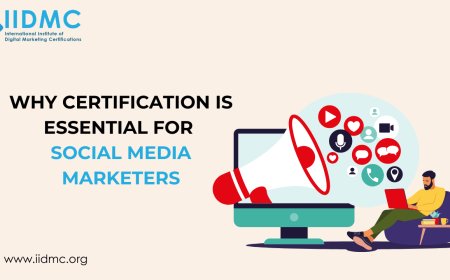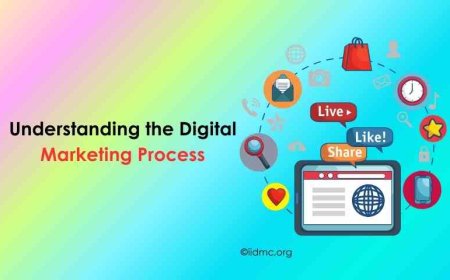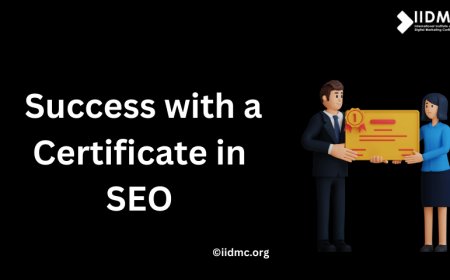Want a Better Job? Get a Digital Marketing Certificate
Get a better job with a digital marketing certificate. Gain practical skills, upgrade your resume, and access new and better career opportunities.

Do you ever wonder why some people get good jobs quickly? It’s often because they have digital skills. Today, most businesses work online, so companies need people who can promote their brand and reach customers through the internet.
A Digital Marketing Certificate can help you do that. It proves you know the basics and are ready for digital marketing jobs. Whether you’re a student or a working professional, a Digital Marketing Certification can help you get better job opportunities.
Why Digital Marketing Skills Are in High Demand
Companies are shifting budgets away from print, TV, and radio toward search engines, social platforms, and email. Online channels let companies target specific customers, track exactly what works, and scale quickly. Because of this, the demand for workers who understand SEO, advertising platforms, analytics, and content strategy is growing.
-
Measurable results: Digital campaigns give clear metrics (clicks, conversions, cost per acquisition). Employers value people who can read and act on data.
-
Customer behaviour online: Most customer journeys start with a Google search or social post, businesses need people who shape that journey.
-
Cost-effectiveness for companies: Digital channels often give higher ROI when run well. Employers hire certified people to reduce waste.
-
Industry reach: From healthcare to finance to retail, every sector needs digital presence, so job opportunities spread across industries.
How a Digital Marketing Certificate Improves Your Job Chances
A Digital Marketing Certificate serves two main purposes: skill building and credibility.
-
Proof of skills: A certificate shows employers you completed training and learned specific tools and techniques.
-
Stand out in hiring: When two resumes look similar, a certificate can be the deciding factor.
-
Practical experience: Many certifications include projects or case studies you can show in interviews.
-
Faster onboarding: Certified hires typically adapt faster because they already know the common platforms and metrics.
-
Confidence boost: Certification often involves hands-on work which helps you discuss your experience clearly in interviews.
Skills You Learn from a Digital Marketing Certification
A good Digital Marketing Certification covers both strategy and tools. Below are the typical, in-demand modules and why they matter.
-
SEO (Search Engine Optimization): Optimize a website so it ranks higher in Google search. You’ll learn keyword research, on-page SEO (titles, meta tags), technical SEO (site speed, mobile-friendliness), and link-building basics. This helps organic traffic grow without paying for each click.
-
SEM & Google Ads (Paid Search): Create effective paid campaigns on Google. Learn how to choose keywords, write ads, set bids, and measure ROI. This drives immediate traffic for sales, signups, or leads.
-
Social Media Marketing: Plan and run campaigns on Facebook, Instagram, LinkedIn, etc. Learn audience targeting, creative best practices, and how to convert engagement into customers.
-
Content Strategy & Copywriting: Produce content that attracts users and guides them to act — blog posts, landing pages, ad copy, and social posts. Good writing increases conversions and builds brand trust.
-
Email Marketing: Build email lists, segment audiences, create drip campaigns, and track open/click rates. Email is one of the most cost-effective ways to retain customers.
-
Analytics & Reporting: Use Google Analytics and platform analytics to read traffic, conversion funnels, and campaign performance. Learn to turn numbers into actionable decisions.
-
Performance Marketing & Attribution: Optimize campaigns for ROI — not just clicks. Learn how to allocate budgets to what produces the best results.
-
Tools & Automation: Practical knowledge of tools like Google Analytics, Google Ads, Facebook Business Manager, Canva, and basic marketing automation platforms.
Key Career Benefits of Getting Certified
Beyond particular skills, certification affects your long-term career.
-
Better employability: Employers often filter candidates by specific skills; certification increases your match rate.
-
Higher starting salary: Certified candidates typically command higher pay than uncertified peers because they bring demonstrable skills.
-
Career flexibility: With digital skills you can move across industries — from e-commerce to healthcare — because the core principles of digital marketing apply everywhere.
-
Faster promotions: Once you prove impact on business metrics (leads, sales, CAC), you become a stronger candidate for senior roles.
-
Freelancing & entrepreneurship: A certificate helps you win clients or launch a business since it demonstrates competence to paying customers.
-
Networking & resources: Many certification programs include communities, templates, or access to mentors that help you grow professionally.

How to Choose the Right Certification for Your Career Path
Not all certificates are equal. Choose based on goals, practical work, and credibility.
-
Define your goal: Do you want SEO, performance marketing, social media, content, or a generalist role?
-
Syllabus depth: Does the course cover practical tools and not just theory? Look for modules on Analytics, Google Ads, and at least basic hands-on SEO.
-
Hands-on projects: Does it include real assignments (campaigns, audits, content creation)? These projects become your portfolio.
-
Trainer experience: Are the trainers industry practitioners or academics? Industry practitioners bring real examples.
-
Certification recognition: Is the certificate from a recognized institute? Recognized names help, but good portfolio work can matter more than a logo alone.
-
Placement / internships: Does the program help with internships, interview prep, or job placements?
-
Tools coverage: Does it train on Google Analytics, Google Ads, Facebook Ads Manager, and common SEO tools?
-
Reviews & alumni outcomes: Check student reviews and LinkedIn alumni to see where graduates work.
-
Duration & format: Match the course length and format (self-paced vs live) to your schedule.
-
Cost vs ROI: Consider the fee, but focus on practical value and placement help. Cheap courses with no projects may offer low ROI.
Best Global Institute for Digital Marketing Certifications
If you’re looking for the best place to learn digital marketing and build a strong career, IIDMC (International Institute of Digital Marketing Certifications) is one of the top global choices. IIDMC is known for offering world-class Digital Marketing Certifications that help students, professionals, and business owners gain real digital marketing skills in a simple and practical way.
Why IIDMC Is the Best Global Institute
IIDMC is trusted across the world because it focuses on real skills, updated course content, and hands-on training. Unlike many institutes that only teach theory, IIDMC trains you with the latest tools, real campaigns, and practical assignments.
Key reasons why IIDMC stands out
-
International recognition for its high-quality Digital Marketing Certificates
-
Industry-updated curriculum designed by global digital marketing experts
-
Practical training through live projects, tools, and case studies
-
Beginner-friendly teaching style, suitable for students and working professionals
-
Certification accepted globally, helping you apply for jobs in any country
-
Expert trainers with real industry experience
-
Flexible learning options for online and self-paced learners
Who Can Join IIDMC?
IIDMC is designed for everyone who wants to grow in digital marketing.
-
Students looking for career opportunities
-
Working professionals who want to upskill
-
Freshers trying to enter the digital industry
-
Entrepreneurs who want to promote their business
-
Freelancers who want to increase their income
How a Certification Helps You During Job Interviews
Certification gives you concrete examples to discuss, which is more persuasive than abstract claims.
-
Project stories: You can describe a campaign you ran, the tools you used, the goal, and the measurable outcome.
-
Technical confidence: When asked about CTR, CPC, ROAS, funnels, or analytics, you’ll answer clearly and show you understand how metrics tie to business goals.
-
Portfolio-ready: Use real assignments as portfolio pieces — screenshots, campaign screenshots, reports, or links.
-
Problem-solving examples: Explain how you optimized a campaign: what you tested, what you learned, and the result. Employers love this structured thinking.
-
Professional language: Certification teaches the right industry terms and frameworks — this helps you communicate with hiring managers and teams.
Top Industries Hiring Digital Marketing Professionals
Because digital presence matters everywhere, many industries hire digital marketers. Below are common sectors and what they typically need.
-
E-commerce: Product listing, ads, performance marketing, and conversion optimization.
-
IT & Software: Content marketing, thought leadership, lead generation for B2B sales.
-
EdTech: Student acquisition campaigns and retention marketing.
-
Healthcare: Local SEO, reputation management, patient acquisition.
-
Finance: Trust-building content, lead nurturing via email and ads.
-
Real Estate: Local targeting, listing promotion, lead forms.
-
Retail & Fashion: Social media, influencer collaborations, product ads.
-
Travel & Hospitality: Seasonal campaigns, performance marketing, and local ads.
-
Media & Agencies: Campaign planning, multi-client management, and creative strategy.
-
Startups: Cost-efficient growth, experimentation, and analytics-driven decisions.
Job Roles You Can Apply for After Certification
A Digital Marketing Certification unlocks multiple entry-level and specialized roles.
-
Digital Marketing Executive: Helps run campaigns across channels and supports strategy execution.
-
SEO Specialist: Focuses on organic search growth and on-site improvements.
-
PPC / Google Ads Specialist: Manages paid search campaigns for lead or sale generation.
-
Social Media Manager: Plans and executes content, engagement, and paid social campaigns.
-
Content Strategist / Writer: Creates content that drives traffic and leads.
-
Email Marketing Executive: Designs campaigns that nurture leads and retain customers.
-
Performance Marketing Analyst: Tracks and optimizes paid campaigns for ROI.
-
Digital Marketing Strategist: Creates broader plans combining channels to meet business goals.
-
Freelancer / Consultant: Offers services to multiple clients or handles SMB marketing.
Salaries of Digital Marketing Roles
Salaries depend on location, company size, skillset, and proven results. Certification often helps you enter higher salary bands faster.
-
Entry-level / Freshers: ₹2.5 LPA – ₹4.5 LPA (varies by city and employer).
-
Mid-level (2–5 years): ₹5 LPA – ₹12 LPA depending on specialization and impact.
-
Senior / Specialist / Performance roles: ₹8 LPA – ₹20 LPA+ for experienced performance managers or leaders in big cities or product firms.
-
Freelancers: Income varies widely; with steady clients you can earn ₹30,000–₹1,00,000+ monthly.
A Digital Marketing Certificate is one of the easiest and smartest ways to improve your career today. It helps you learn important online marketing skills, makes your resume stronger, and opens doors to better job opportunities across many industries. Whether you are starting your career or looking for a change, a Digital Marketing Certification gives you the confidence and knowledge you need to grow faster in the digital world.





























